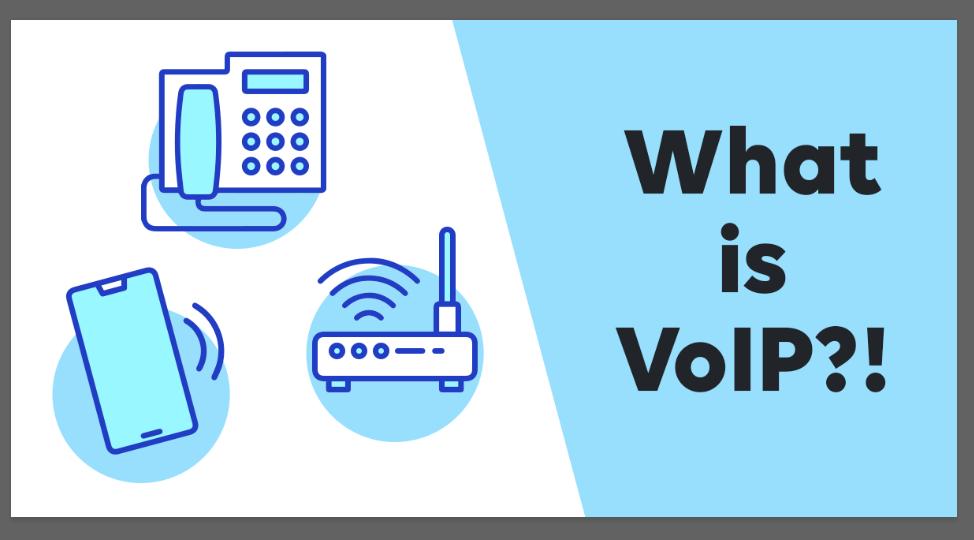
VoIP is growing in popularity at a rapid rate. Whether your business is considering upgrading to it or implementing it for the first time, this guide will help you understand what is VoIP.
Non-fixed VoIP phone numbers aren’t tied to a specific location or device, and they can be used by anyone who has access to the internet. This provides flexibility for teams to work from anywhere.
What is VoIP?
VoIP takes standard Internet connections and makes calls cheaper (and better quality). It’s a great option for businesses that need multiple lines, flexibility, and reliability without cutting into the bottom line.
Behind the scenes, VoIP uses data packets to transmit voice signals over the Internet to the person on the other end of the call. The process happens almost instantly and is a huge reason why VoIP sound quality can rival traditional landline phone services.
You can make VoIP calls from any kind of device that has an Internet connection. That includes computers with VoIP softphones and mobile devices like smartphones and tablets that use an app to access the service. In addition, a wide variety of desk phones work with most VoIP systems.
You can also set up VoIP to connect over private links if you want to ensure security and avoid public peering issues. However, most hosted and cloud-based VoIP providers handle these updates and monitoring offsite in the cloud. This helps reduce maintenance costs and provides a higher level of reliability.
VoIP Basics
VoIP is a system that converts traditional voice signals into digital data packets. These packets are transmitted over a high-speed internet connection such as an ethernet cable or Wi-Fi. The caller can use a computer with software and an inexpensive microphone or a special VoIP phone that plugs directly into the network with a wired Ethernet adapter or a telephone cord.
This type of technology is different from the circuit switching used by PSTN. This difference is what allows calls to be made across the country and even internationally at a much cheaper cost.
Local businesses benefit from lower costs, a scalable solution, and advanced features (especially when compared to a landline option). However, VoIP’s reliability is also important. A business needs reliable internet service to ensure the VoIP phone system works at all times. This is especially true during a power outage. Generally, desk phones need power in order to function. This is why it is essential to have a backup power source for your office.
VoIP Features
VoIP works by converting standard analog phone calls into digital voice packets that are then transmitted over the Internet. This process allows employees to connect to the company’s unified communications network via any device that has the service client software installed. This includes VoIP phones, smartphones, tablet computers and other network-ready devices. This flexibility gives employees the freedom to work from home or on-the-go without compromising call quality.
Another important feature of VoIP is its ability to instantly scale up or down based on the needs of your business. For example, if you have an influx of sales leads or new customers, adding more lines and extensions is simple and requires no extra cost.
VoIP systems also offer features that help save you time and money, such as auto attendants, virtual receptionists, call transferring, voicemail to email, on-hold music and video conferences. They even let you repurpose your existing human resources to focus on more valuable activities rather than handling routine calls. This can mean more time for customer-facing tasks like providing support and sales to clients.
VoIP Costs
The costs associated with VoIP are usually lower than traditional phone systems. This is because VoIP doesn’t require new hardware and relies on your existing internet infrastructure. In addition, VoIP offers a flexible subscription-based model that allows you to pay only for the services and equipment you need. The one-time setup fees are also significantly less with a VoIP system.
In addition to the reduced costs, VoIP’s scalability makes it easy for you to add additional lines or extensions at any time. This saves you money on purchasing new equipment and hiring more employees to handle the workload. It also means that you can repurpose your current employees to focus on other tasks like answering customer calls or helping with sales and marketing activities.
To get the most out of your VoIP system, you’ll need a fast and reliable internet connection. You should consult with your service provider to see if your current Internet speed can support VoIP and to find out what kind of equipment you’ll need. You can also look into getting a cable or fiber-based Internet connection for better quality.
VoIP Security
As with landline telephony, VoIP systems are susceptible to cyberattacks. However, there are ways to maximize your business’ security with this technology.
Encrypting your VoIP data protects against hacker snooping and criminal eavesdropping. You should always ask a provider about the type of encryption they offer. SRTP (Secure Real-time Transport Protocol) and TLS (Transport Layer Security) are two types of encrypted protocols that help prevent snooping and keep your calls private. This is especially important if you manage sensitive data or need to comply with HIPAA regulations.
A good VoIP system will also have a firewall that tracks incoming and outgoing data according to security rules, flagging suspicious activity. This prevents malware from corrupting the system and granting hackers easy access.
Other security measures include limiting physical access to networking equipment, protecting user credentials with a strong password and two-factor authentication, preventing ghost calls on IP phones, and performing regular vulnerability assessments. By following these best practices and selecting a trustworthy VoIP provider, you can minimize the risk of a cybersecurity attack on your business.